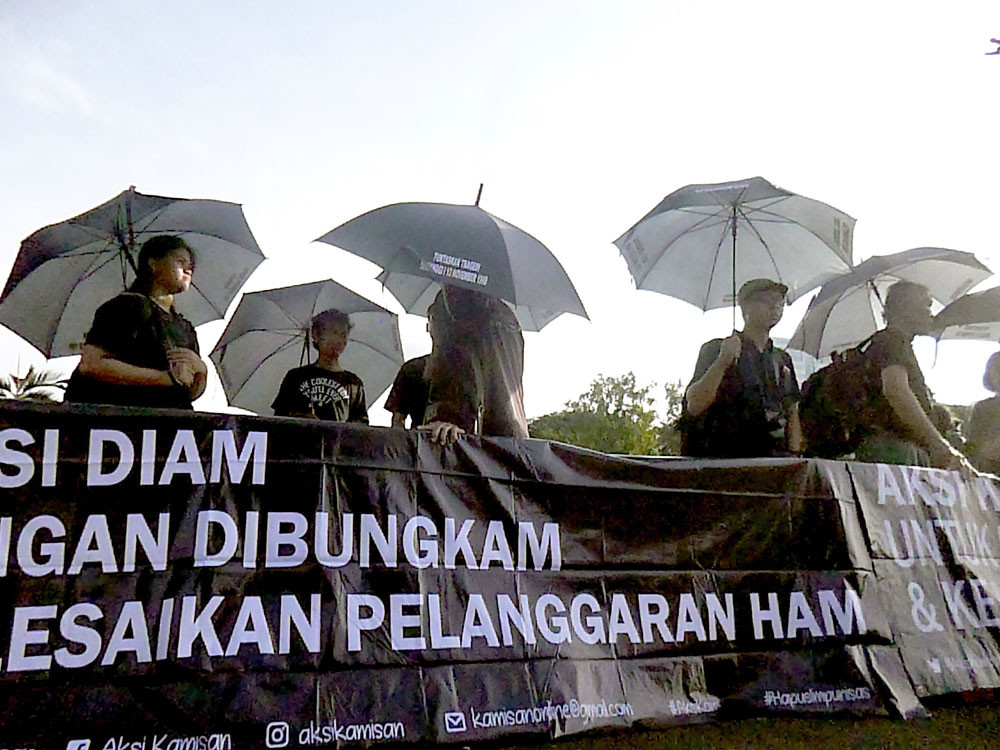Festival turns to art, culture to urge youth dialogue on Indonesia's human rights history
A three-week festival launched on Sunday aims to nurture cross-generational dialogue and discussion among the country's youth on Indonesia's human rights record through art and culture.
Change Size
 Families of victims and survivors of human rights violations take part in the Kamisan (Thursday) weekly rally in front of the State Palace in Central Jakarta on Jan. 10, 2019. (The Jakarta Post/Alexis Berthonnet)
Families of victims and survivors of human rights violations take part in the Kamisan (Thursday) weekly rally in front of the State Palace in Central Jakarta on Jan. 10, 2019. (The Jakarta Post/Alexis Berthonnet)
A
s part of a multi-faceted effort to highlight oft-overlooked perspectives on unresolved human rights violations in Indonesia through intergenerational dialogue, the Asia Justice and Rights (AJAR) non-profit has organized the 2020 Humanity Youth Festival in collaboration with local volunteers, activists and artists.
The online festival, which runs for three weeks from July 12 to Aug. 2, aims to preserve the recollections of people who have survived human rights atrocities, as well as the aspirations of marginalized groups in the country, including the lesbian, gay, bisexual and transgender (LGBT) community.
AJAR Indonesia program director Dodi Yuniar said he expected the event to be a platform where young people could connect with each other and discuss the country’s history of impunity and violence in the human rights context.
“This project will be developed further to reach more people. All online materials on the website will be [distributed] directly to survivors, since some of them still do not have internet access,” Dodi said during the festival's opening ceremony on Sunday.
He said that 18 university students from across the archipelago had volunteered to gather survivors' stories in an AJAR-sponsored program.
Among the focal issues of the festival is the 1965-66 persecution and massacre of hundreds of thousands of alleged sympathizers of the now-defunct Indonesian Communist Party (PKI) in nationwide anti-communism operations.
To this day, survivors of the so-called communist purge are still haunted by the atrocities that occurred then, and even more so by the fact that many officials involved in the mass killings have never been brought to justice.
The Humanity Youth Festival also sheds light on the "Labarik Lakon" (stolen children) community in East Timor (present-day Timor-Leste) under Indonesian occupation from 1975 to 1999.
Thousands of East Timorese children were taken to Indonesia during that period without their families’ consent. Many of these "stolen children" would later question their identity and face stigmatization, according to a report commissioned by the Commission for Reception, Truth and Reconciliation (CAVR) in East Timor.
Coordinator Fatia Maulidiyanti of Indonesia's Commission for Missing Persons and Victims of Violence (Kontras) said that the survivors' stories could be preserved only by open-minded youth who were willing to speak truth to power.
“The youth are positioned as both an object and subject of history. There has been a renewed sense of skepticism among young people regarding the widely accepted version of history,” she said.
Festival curator Ika Vantiani said that the event emphasized the intersection of art and politics to counteract decades of state indoctrination through cultural products, including film and music.
“My hope is that, from this day on, young people won’t regard human rights issues as a ‘heavy’ subject matter,” she said.
The festival showcases a series of short documentaries offering alternative perspectives on past rights violations, such as Kacamata ‘65 (‘65 Lens) and Jarak (Distance), which can be viewed on the website.
At the opening ceremony, musician and activist Ananda Badudu said that art could motivate youth to contribute in bringing about structural change, and that culture was therefore a vital component of change.
“Art exists within the domain of moral politics. It is inseparable from education,” he said.









